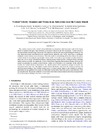Identificador persistente para citar o vincular este elemento:
https://accedacris.ulpgc.es/jspui/handle/10553/58892
| Título: | Vertical Velocity Dynamics and Mixing in an Anticyclone near the Canary Islands | Autores/as: | Estrada-Allis, S. Barcelo-Llull, B. Pallas-Sanz, E. Rodríguez Santana, Ángel Souza, J. M. A. C. Mason, E. McWilliams, J. C. Sangrá Inciarte, Pablo |
Clasificación UNESCO: | 251007 Oceanografía física | Palabras clave: | Ageostrophic circulations Eddies Mesoscale processes Mixing Vertical motion, et al. |
Fecha de publicación: | 2019 | Proyectos: | Flujos de Carbono en Un Sistema de Afloramiento Costero (Cabo Blanco, Nw de África); Modulación A Submesoscala de la Producción, Exportación y Consumo de Carbono | Publicación seriada: | Journal of Physical Oceanography | Resumen: | The complex structure of the vertical velocity field inside an anticyclonic eddy located just south of the Canary Islands is analyzed through a high-resolution ocean model. Based on the flow divergence, vertical velocity is decomposed into various forcing components. The analysis reveals that advection and stretching of vorticity are the most important forcing contributions to the vertical velocity within the eddy. In the mixed layer, a small-scale multipolar vertical velocity pattern dominates. This is the result of vertical mixing effects that enhance the surface vertical velocity by increasing the ageostrophic velocity profile. As a result, an ageostrophic secondary circulation arises that acts to restore thermal-wind balance, inducing strong vertical motions. Nonlinear Ekman pumping/suction patterns resemble the small-scale vertical velocity field, suggesting that nonlinear Ekman effects are important in explaining the complex vertical velocity, despite an overestimate of its magnitude. In the eddy thermocline, the vertical velocity is characterized by a dipolar pattern, which experiences changes in intensity and axisymmetrization with time. The dipolar vertical velocity distribution arises from the imbalance between the advection and stretching of the vorticity forcing terms. A vertical velocity dipole is also obtained by solving a generalized omega equation from density and horizontal velocity fields, which also shows a preponderance of the ageostrophic term. The ubiquity of dipolar vertical velocity distributions inside isolated anticyclones is supported by recent observational findings in the same oceanic region. | URI: | https://accedacris.ulpgc.es/handle/10553/58892 | ISSN: | 0022-3670 | DOI: | 10.1175/JPO-D-17-0156.1 | Fuente: | Journal Of Physical Oceanography [ISSN 0022-3670], v. 49 (2), p. 431-451 |
| Colección: | Artículos |
Citas SCOPUSTM
16
actualizado el 08-jun-2025
Citas de WEB OF SCIENCETM
Citations
19
actualizado el 01-mar-2026
Visitas
114
actualizado el 14-jul-2024
Descargas
209
actualizado el 14-jul-2024
Google ScholarTM
Verifica
Altmetric
Comparte
Exporta metadatos
Los elementos en ULPGC accedaCRIS están protegidos por derechos de autor con todos los derechos reservados, a menos que se indique lo contrario.
